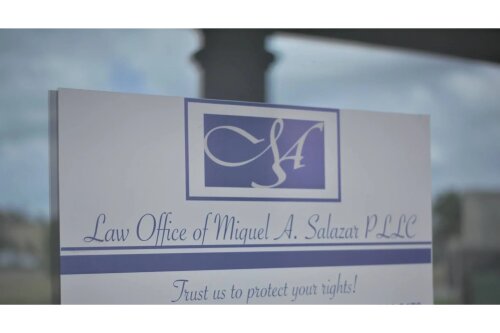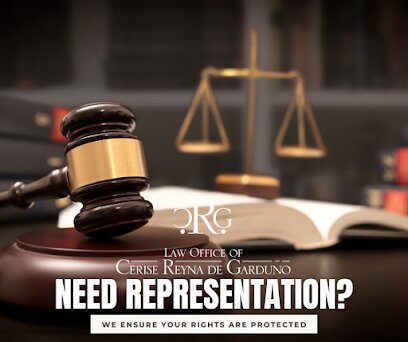Best Juvenile Law Lawyers in Brownsville
Share your needs with us, get contacted by law firms.
Free. Takes 2 min.
List of the best lawyers in Brownsville, United States
About Juvenile Law Law in Brownsville, United States:
Juvenile law covers legal matters involving young people and their families. In Brownsville, which is in Cameron County, Texas, juvenile cases generally involve issues such as alleged delinquent conduct by minors, status offenses like truancy or curfew violations, child-protection matters including abuse and neglect investigations, dependency and termination of parental rights, probation and diversion programs, and sometimes the transfer of serious matters to adult court. State statutes and local court procedures govern how cases move through the system, with an emphasis in most juvenile systems on rehabilitation, community supervision, and services rather than purely punitive sanctions.
Why You May Need a Lawyer:
Families and juveniles often need legal help in these common situations:
- Allegations of delinquency or criminal conduct - even minor offenses can have long-term consequences for school, employment, and licensing.
- Juvenile detention or threats of detention - to protect the youth's rights during hearings and placement decisions.
- Child-protection investigations by state agencies - when Child Protective Services is investigating abuse or neglect, legal counsel can help protect parental and child rights and help navigate removal hearings.
- Termination of parental rights or adoption proceedings - these cases can permanently change family relationships and require experienced legal guidance.
- Probation violations or petitions to modify dispositions - lawyers can advocate for alternatives to confinement and for appropriate services.
- Requests to have juvenile records sealed or non-disclosed - an attorney can explain eligibility and file the appropriate petitions.
- Cases with potential transfer to adult court - serious allegations may trigger certification or transfer procedures where legal strategy is critical.
- Situations involving school discipline that could lead to juvenile referrals - lawyers can coordinate school and court responses to protect the student.
Legal representation helps protect constitutional rights, ensures appropriate notice and procedure, evaluates diversion and service options, and advocates for outcomes that limit long-term harm to the child.
Local Laws Overview:
Key local and state points relevant to juvenile law in Brownsville include these general matters:
- Governing statutes - Juvenile matters in Brownsville follow Texas law, including provisions in the Texas Family Code and related juvenile justice statutes. Local courts apply those state laws and local procedural rules.
- Court structure - Juvenile cases are handled at the county level by juvenile or family courts and supported by the county juvenile probation department. Brownsville is served by agencies and courts located in Cameron County.
- Emphasis on rehabilitation - The juvenile system typically prioritizes treatment, education, and community-based programs over incarceration for most offenses, but serious or violent conduct can produce different outcomes.
- Right to counsel and due process - Juveniles have procedural rights in hearings, including notice, the right to confront witnesses, and often the right to appointed counsel if they cannot afford one.
- Confidentiality of records - Juvenile court records are usually treated differently from adult criminal records. Many records are confidential or eligible for sealing, but exceptions exist for transfers to adult court or specific public-safety disclosures.
- Diversion and alternatives - Local prosecutors and juvenile probation often offer diversion, deferred adjudication, and community service or treatment programs to avoid formal adjudication when appropriate.
- Child-protection procedures - Investigations and removals related to abuse or neglect are governed by state child-protection law and involve the Texas Department of Family and Protective Services or its contractors, emergency hearings, and mandatory timelines for hearings and reunification efforts.
- Parental responsibility statutes - Parents can face civil or criminal consequences in certain circumstances, such as contributing to delinquency or neglect, and courts can order services designed to improve parenting and keep families together when safe.
Frequently Asked Questions:
What age is a juvenile in Brownsville and how does that affect jurisdiction?
Age definitions vary by state law. In Texas, juvenile statutes generally apply to minors, and state law sets specific age ranges and exceptions. The precise age of juvenile court jurisdiction and rules about older teens can change over time. If age or transfer issues are important in a case, consult a local attorney or the county juvenile office to confirm current rules.
Does a juvenile have the right to an attorney?
Yes. Juveniles in court proceedings generally have the right to legal counsel. If the family cannot afford a lawyer, the court may appoint one. Having an attorney helps ensure procedural protections, negotiates diversion or service options, and advocates in detention and disposition hearings.
Will a juvenile go to adult jail if charged with a serious offense?
Most juvenile systems use separate juvenile facilities. However, very serious offenses may lead to procedures that transfer a youth to adult criminal court under state law. The standards and age thresholds for transfer vary. If transfer is a risk, seek prompt legal representation to challenge or negotiate alternatives.
What are status offenses and how are they handled?
Status offenses are behaviors that are only considered offenses because of the young person’s age, such as truancy, running away, curfew violations, or underage alcohol use. Courts often use diversion, counseling, or educational programs for status offenses rather than detention, though local practice varies.
What happens during a child-protection investigation?
When a child-protection agency receives a report, investigators assess the child’s safety, speak with family members, and may remove a child temporarily if they determine immediate danger. Courts hold timely hearings to review removals and plan for reunification or other permanent arrangements. Families should understand legal rights and consider counsel early in the process.
Can juvenile records be sealed or expunged?
Many juvenile records are eligible for sealing or nondisclosure after certain conditions are met, like completing a program or reaching an age threshold. The process and timing differ by state and by the nature of the offense. A lawyer can evaluate eligibility and file the necessary petitions.
What is diversion and is it right for my child?
Diversion programs allow young people to avoid formal adjudication by completing specified requirements such as counseling, community service, or school attendance. Diversion can prevent a formal record and focus on rehabilitation. Whether it is appropriate depends on the case facts and the prosecutor or juvenile probation policies.
How long will a juvenile case take?
Case timelines vary widely. Some matters resolve quickly through diversion or informal agreements, while contested adjudication or removal and termination proceedings can take months or longer. Emergency hearings and statutory deadlines can accelerate certain steps. Your attorney can explain likely timelines for your situation.
Can parents be charged for a child’s actions?
In some circumstances parents face legal consequences, such as criminal charges for failure to control a child, contributing to delinquency, or for neglect or abuse. Courts also impose orders requiring parenting classes, supervision, or services to address the family issues underlying a child’s behavior.
How do I find a good juvenile law attorney in Brownsville?
Look for attorneys with juvenile law experience, local courtroom familiarity, and strong references. You can contact the county juvenile court for information about court-appointed counsel, consult local bar associations, or reach out to legal aid organizations for low-cost representation. Schedule an initial consultation to discuss experience, fees, likely strategies, and next steps.
Additional Resources:
- Cameron County Juvenile Probation Department - local office that supervises juvenile cases and provides information on community programs and procedures.
- Cameron County Juvenile Court - the county court that handles juvenile matters and sets hearing schedules and procedures.
- Texas Department of Family and Protective Services - state agency that investigates allegations of abuse and neglect and administers child-protection services.
- Texas Juvenile Justice Department or its successor agencies - oversees juvenile justice programs and facilities at the state level.
- Texas RioGrande Legal Aid and other legal aid organizations - provide free or low-cost legal assistance for eligible families in South Texas.
- Local bar associations and the Texas State Bar - resources for lawyer referrals and information on legal rights and attorney qualifications.
- Court Appointed Special Advocates - volunteer advocates who can help represent a child’s best interests in dependency cases where available locally.
- Local school district student-support programs and community mental-health providers - these resources can provide services that courts consider in rehabilitation-focused dispositions.
Next Steps:
If you or your child are involved in a juvenile matter in Brownsville, consider these practical steps:
- Stay calm and gather information - write down names, dates, and the details of any allegations, notices, or agency contacts.
- Attend all scheduled hearings and meetings - missing a hearing can have serious consequences for the youth and the family.
- Request legal representation immediately - if you cannot afford an attorney, ask the court about appointed counsel at the first opportunity.
- Preserve documents and evidence - school records, medical records, communication logs, and witness names can be important to your case.
- Explore diversion and service options - where appropriate, these alternatives can prevent formal adjudication and reduce long-term impacts.
- Follow court-ordered conditions - complying with orders and services helps demonstrate cooperation and can improve outcomes.
- Ask questions - demand clear explanations about the charges, the process, timelines, rights, and potential consequences.
- Consider local resources - counseling, family services, mentoring programs, and educational support can address root causes and are often viewed favorably by courts.
Remember that this guide is informational and not a substitute for legal advice. Laws and procedures change, and specific legal rights and options depend on the facts of each case. For case-specific advice, contact a qualified juvenile law attorney in the Brownsville area as soon as possible.
Lawzana helps you find the best lawyers and law firms in Brownsville through a curated and pre-screened list of qualified legal professionals. Our platform offers rankings and detailed profiles of attorneys and law firms, allowing you to compare based on practice areas, including Juvenile Law, experience, and client feedback.
Each profile includes a description of the firm's areas of practice, client reviews, team members and partners, year of establishment, spoken languages, office locations, contact information, social media presence, and any published articles or resources. Most firms on our platform speak English and are experienced in both local and international legal matters.
Get a quote from top-rated law firms in Brownsville, United States — quickly, securely, and without unnecessary hassle.
Disclaimer:
The information provided on this page is for general informational purposes only and does not constitute legal advice. While we strive to ensure the accuracy and relevance of the content, legal information may change over time, and interpretations of the law can vary. You should always consult with a qualified legal professional for advice specific to your situation.
We disclaim all liability for actions taken or not taken based on the content of this page. If you believe any information is incorrect or outdated, please contact us, and we will review and update it where appropriate.










